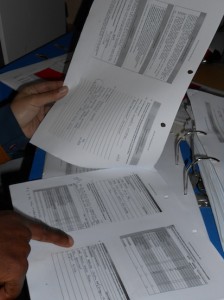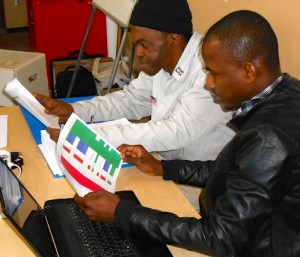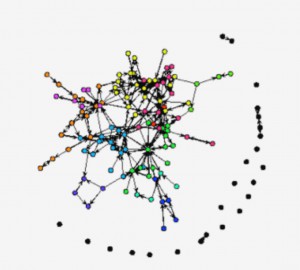CT-CIVNET :: Cape Town Civic Network Study (2012-2017)
Research Project: CT-CIVNET :: Cape Town Civic Network Study

The Cape Town CIVNET study is a survey based research project that has interviewed over 130 civil society organisations in Cape Town. It is based on similar studies in Bristol and Glasgow by Mario Diani, and a study in Stockholm by Henrik Ernstson. Part of the research process meant to critically reflect how to translate this survey from these European cities to Cape Town.
The “Cape Town Civic Network Study” is a research project based on a social network survey that focuses on the urban environment and environmental justice. Rather than only focusing on ‘green’ environmentalist issues like habitat protection and nature conservation, the study uses a political ecological lens of the urban environment including struggles over access to basic services like water, electricity, housing and sewage. This broadening scope is followed by also broadening the type of cities, here Cape Town in South Africa, where social network analysis (SNA) have been carried out in studying environmental and social movements, which mainly has been in the US and Europe. More studies in previously colonised and so called ‘developing countries’ are needed. The study also combines social network analysis with a parallel urban ecology project taking place in the same focal geographical area.
Research questions
The CIVNET study aims to contribute to the following broader questions: What is the structure of civil society in highly unequal urban geographies like those of post-apartheid Cape Town? Given structural and historical constraints, how are alliances built, and around what broader issues do alliances emerge? What different modes of coordination—from more instrumental alliance networks, to social movements—do civic networks engender and make possible? What is the role of state and dominant political parties in structuring these relations? What is the role of space and ‘green spaces’ in structuring these networks? And under what conditions could we possibly speak of a ’socio-ecological’ mode of collective action? Finally, in what limited or extensive ways do civil society influence environmental decisions and urban planning and what are activists’ experiences of trying to influence decision-making and public discourse?
Methodology
To answer these questions, a multi-lingual team of field researchers including the PI, interviewed more than 130 civil society organisations in Cape Town during 2013 and 2014. This included well-recognised organisations that are active at the scale of the city, to smaller and perhaps lesser-known organisations in a contiguous geographical area that stretches from the very wealthy to the poor, from predominantly white to black areas of this segregated city (from those classified during apartheid as White, Coloured, and African Bantu), and that has varied amount of parks and ‘green spaces’ and different type of housing stock, from elite residential, ‘middle class’ suburbs, working class flats, backyard dwellings and informal shack dwellings. We did a census of organisations in this continuous geographical area, trying to find all organisations active on environmental and environmental justice issues, using snow-ball sampling methods common to social network survey of this kind.
Each structured interview took from 1-2 hours and provided questions around the relations that civic associations have among themselves, relations to state authorities, what issues they mobilise on, what public events they participated in during the last five years (choosing from a pre-defined list), and where in space they are actively engaging in activities. Based on this extensive field research, we composed a relational network data base of 129 organisations. Based on this, we followed up during 2014 with five group discussions with in total 25 representatives from these groups. On 6 June 2015, and based on the field research, we also organised the Cape Town Civil Society Conference to discuss and debate emergent results and broader questions about democratisation, conservation and environmental justice of Cape Town. During 2014 and 2015 we have presented early results and more of this will be presented during 2016.
The study is coordinated and carried out by PI Dr. Henrik Ernstson in close collaboration with Professor Mario Diani and Dr. Lorien Jasny and field researchers from the Sustainable Livelihoods Foundation. The study is a collaboration between the African Centre for Cities at the University of Cape Town, KTH Environmental Humanities Laboratory at the KTH Royal Institute of Technology, supported by funds from the Swedish Research Council Formas. Contact PI here.
Update CIVNET – as of August 2015

Trained and multilingual field workers in action preparing for further interviews in the Cape Town CIVNET study during 2013.
- During 2013 and 2014 extensive field work to do the network survey was carried out by a multi-lingual team. You can read more about our field work here.
- Network analysis was also started during 2013 and preliminary presentations of results was presented, for instance at UC Davis in California.
- During 2015 more analysis of the 129 organisations have been carried out. This relational database have also been used to prepare for group discussions and a large conference.
- Organized 5 group discussions with in total 25 spokespersons in October 2014. During these we presented emergent findings from our analysis to generate discussions to increase our ability to do grounded interpretation of the data. This was also a chance for organisers to ‘speak back’ to our results before we presented it elsewhere. In particular the group discussions focussed on what facilitates and hinders collaboration, the role of apartheid spatial legacies, the role of the state of so called public forums used by the city, and general questions about the state of democracy in Cape Town and South Africa. Many expressed that they had been helped in thinking about their own organisations and that they had made contacts with other groups.
- Organised The Cape Town Civil Society Conference on 6 June 2015 at the University of Cape Town. Based on extensive field research and the relational database, and the group discussions we invited organisations to discuss our emergent findings in the context of environmental issues broadly and the deepening of the democratic project of Cape Town. The morning started with hip-hoppers Emile Jansen and the group Mixed Mense with Leeroy and Stefan. This helped to foreground the conference in the rich and varied experience about organizing in the city, which those attending brought to the conference. Professor Peter Alexander reflected on historical and contemporary challenges of civil society and the increasing use of violence and securitisation of the state in policing public meetings in South Africa. Professor Mario Diani developed ideas from having studied collective action in different places and cities in the world. Dr. Henrik Ernstson presented initial results from the CIVNET study. This was followed with group discussions and presentations by those attending. Over 60 attended the meeting from some 40 different organisations. More information here.
Early results have been presented (not exhaustive list) and publications and reports are being prepared:
- Dr. Henrik Ernstson presented at SESYNC in Maryland in May 2015, and at University of Maryland, also in May 2015.
- Professor Mario Diani has presented from this project at INSNA in June 2015 and earlier in Spain.
- Dr. Lorien Jasny has also presented at INSNA in June 2015.



